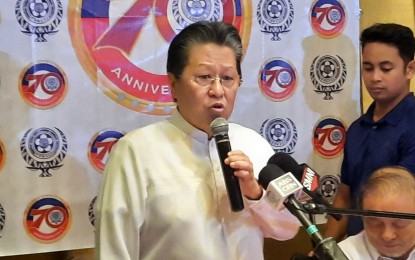
70TH ANNIVERSARY. Federation of Filipino-Chinese Chambers of Commerce and Industry, Inc. (FFCCCII) president Cecilio Pedro delivers his remarks during a press conference in Makati Shangri-la, Makati City on Thursday (Feb. 29, 2024). The federation is celebrating its 70th year on March 9, 2024. (PNA photo by Kris M. Crismundo)
MANILA – Federation of Filipino-Chinese Chambers of Commerce and Industry, Inc. (FFCCCII) president Cecilio Pedro said Thursday they favor salary adjustments through the regional wage boards over a legislated pay increase.
Pedro said in a press conference in Makati City that policymakers should give businesses a breather from the impacts of high inflation and interest rates and let them stabilize while inflationary pressure has just started easing.
“Now, we are talking about additional wages. Huwag naman ngayon (not now). This is the opportunity for us to stabilize, to hold whatever is needed for us to move forward,” he said.
“I am in favor of salary, wages going up because it is the best interest of majority that salary goes up, so that the poor people, or the people down there can sustain their livelihood. As far as I know, it is important for us to uplift the majority, which is those who are down there, earning minimum wage."
The FFCCCII executive, however, noted that increasing wages could be done not only by legislating pay hikes.
“Sana we should focus on creation of jobs. ‘Pag maraming trabaho, tataas at tataas ang sweldo kasi wala kang makuhang trabahador e (We should focus on the creation of jobs. If more jobs are available, wages will increase because of the limited supply of workers),” he said, noting that “it is a function of demand and supply.”
A PHP100 legislated wage hike for daily minimum earners in the private sector has been approved on the third and final reading in the Senate.
The FCCCII joined the many business groups and employers’ organizations that have expressed opposition to the legislated pay increase.
Meanwhile, FFCCCII will be celebrating its 70th anniversary on March 9 with the theme “Dugong Tsino, Pusong Pinoy” (Chinese by blood, Filipino at heart).
“For our 70th anniversary next month, the Federation has extended invitations to distinguished foreign business leaders and industrialists from across the Asia-Pacific region, persuading them to deepen their engagement by investing in our country,” Pedro said.
He said they have invited businesses from ASEAN neighbors, such as Singapore, Thailand, Malaysia, and Indonesia, as well as big trade partners, among them China, Hong Kong, South Korea, and Japan. (PNA)
